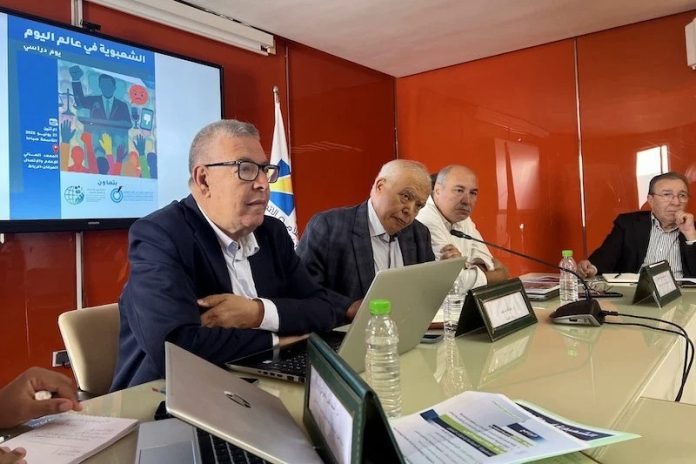Amid growing academic and political interest in the rise of populism, the International Center for Media and Development Studies and the Center for Research in Social Sciences organized a study day on Monday under the theme: “Populism in Today’s World: Challenges and Stakes.”
Scholars and university professors examined in the event, held at the Higher Institute of Information and Communication in Rabat, the multifaceted nature of populism, its definitions, practices, and rhetoric, with particular emphasis on its intersection with political communication, power structures, and the transformation of the public sphere.
The program also included comparative case studies, notably on Israel and Iran, highlighting different populist dynamics.
Discussions addressed the psychological traits of populist leaders and the strain such movements place on traditional political actors and representative institutions.
In his opening remarks, Abdallah Saaf, President of the Center for Research in Social Sciences, warned against the vague and indiscriminate use of the term “populism” in Moroccan political discourse.
He emphasized the need to clarify terminology, distinguishing between “people’s populism” and “state populism,” and argued that the phenomenon is no longer marginal but structurally embedded in contemporary politics.
Mohamed Abdelwahab Allali head of the International Center for Media and Development, focused on “Populism and the Complexities of Political Communication.”
He explained how populist movements employ direct emotional appeals that bypass traditional institutional channels, often using social media to mobilize “the honest people” against “corrupt elites.”
In his analysis of populist rhetoric in Israel and Iran, Al-Alaoui identified shared structural features, including victimhood narratives, charismatic leadership, ideological polarization, and institutional erosion.
Abdelhamid Benkhattab, President of the Moroccan Association of Political Science, noted the absence of a unified definition of populism.
He described it as a political style or strategy lacking ideological coherence, driven by emotional manipulation, and criticized populist figures for vilifying elites and presenting themselves as the voice of a deceived populace, questioning whether “the people” have ever truly held power or if the concept is utopian by nature.
Offering a divergent view, researcher Omar Benjelloun argued that populism is not a full-fledged ideology but rather a rhetorical tool deployed by global capitalism to discredit emerging political alternatives.
He added that while populism appears to activate public consciousness with seemingly simple solutions, these often lack real depth. Benjelloun also raised the example of Moroccan political figure Abdelilah Benkirane, questioning whether he embodies populism both in government and in opposition.
Ismail Hamoudi, a political science professor at Sidi Mohamed Ben Abdellah University, explored the global dimensions of populism, asking whether we are witnessing the emergence of a populist world order.
He outlined four analytical approaches, treating populism as an ideology, a style, or a political strategy, and noted how populist leaders often leverage political psychology to craft strongman personas.
Drawing comparisons between Donald Trump and Hugo Chávez, Hamoudi highlighted shared traits such as personalization of politics and disregard for institutional norms.
While acknowledging concerns over populist party gains, Hamoudi emphasized that such movements do not necessarily lead to greater international conflict, but instead erode liberal democratic frameworks and threaten pluralistic governance.
Participants agreed that populism is not a passing trend but a deep-rooted discourse shaped by socio-economic and technological shifts. It poses serious challenges to democracy and the viability of traditional institutions.
The event took place against a backdrop of both national and international populist ascendance, underscoring the relevance of such discussions and reaffirming the role of academia and think tanks in critically engaging with global transformations.



